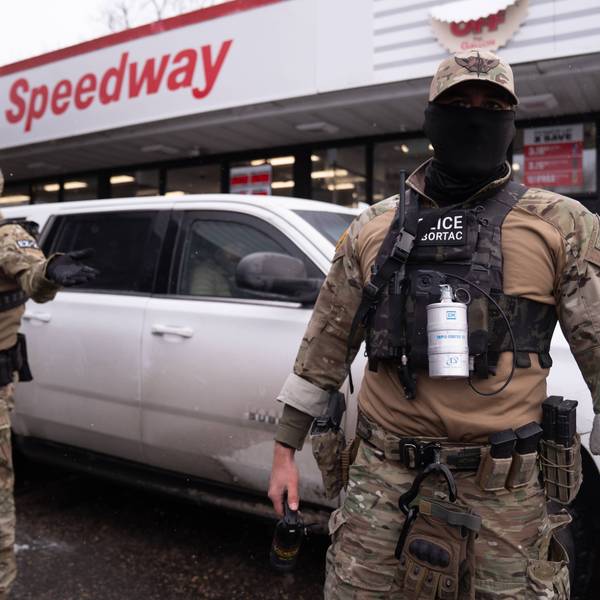In the wake of the August 9 police killing of Michael Brown and ongoing outrage and protests over the failure to indict St. Louis police officer Darren Wilson, President Obama on Monday announced a series of initiatives aimed at stemming police violence and militarization, including the increased use of police body cameras and the formation of a committee to review federal military equipment transfer programs.
During a morning Cabinet meeting, Obama and his staff discussed the newly released internal review (pdf) of federal programs that support the transfer of military supplies from the Department of Defense to local law enforcement agencies, which rights groups say have facilitated the rapid militarization of local police departments.
"The police are bound to protect and serve the communities in which they operate," Kara Dansky, senior counsel for the ACLU, told Common Dreams. "And when the police behave and look like soldiers, it creates culture of militarization, of treating people in communities more like enemies. Our neighborhoods aren't war zones."
While the president on Monday failed to endorse any concrete changes to the military equipment transfer program, Dansky says she is "hopeful" that the White House task force will follow the ACLU's recommendations when delivering their proposed revisions in 120 days. The rights group has been calling for the president to implement a moratorium on the military equipment transfer program, known as the 1033 program, while the administration conducts its review--thus far to no avail.
However, despite these warnings, reforming the transfer program may prove to be politically difficult.
"The limited nature of the White House's response testifies to the reality that transferring military-style gear to police departments remains politically popular in Congress and with the municipalities," the New York Times reports.
The move to increase the use of body cameras--something that Brown's parents, Lesley McSpadden and Michael Brown Sr., have called for to curtail police misconduct--was hailed as a step in the right direction.
The Body Worn Camera Partnership Program, which will provide matching funds to localities who purchase cameras for law enforcement agents, is part of a three-year, $263 million investment package.
Darius Charney, Senior Attorney with the Center for Constitutional Rights, told Common Dreams that although the group supports the use of tools that increase accountability for law enforcement officers, "cameras also introduce a host of very important and complex technological, safety, and privacy issues which must be thought through very carefully before handing out body cameras to thousands of police officers across the country."
Dansky agreed that it is "very important that police departments...have policies in place that protect privacy rights of individuals on films." Further, the program only provides matching funds for 50,000 cameras in a country with "hundreds of thousands" of uniformed police officers.
According to the White House announcement, the federal funds will also be used to expand training for local law enforcement and add more resources for police department reform. The president also announced the formation of a task force to improve "community oriented" policing, which will be chaired by Philadelphia police commissioner Charles H. Ramsey and George Mason University criminal law scholar Laurie Robinson.
Following the announcement, the president met with local and national civil rights leaders along with elected officials, community and faith leaders, and law enforcement officials, to discuss "how communities and law enforcement can work together," according to the White House.
Monday also marked the first meeting of the Ferguson Commission, a 16-person body enlisted by Missouri Governor Jay Nixon to address the underlying "social and economic conditions," which have underscored by the months of protest following Brown's killing.



